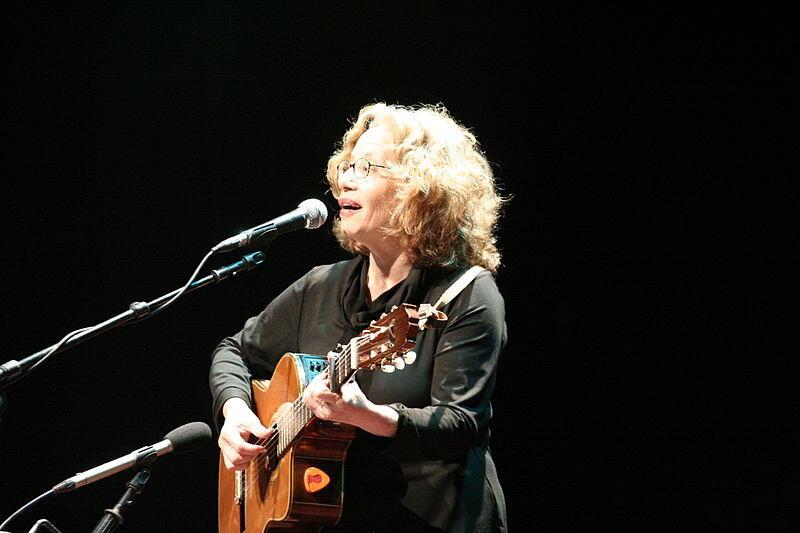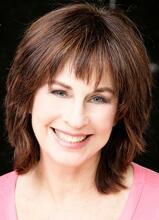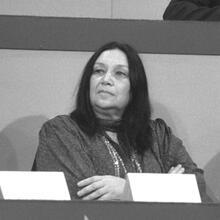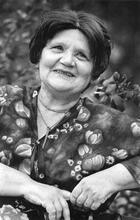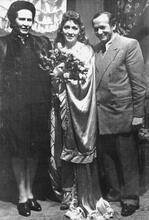Chava Alberstein
Chava Alberstein is a singer-songwriter who by the end of 2020 had recorded over 60 albums, more than any other Israeli singer. Her first three albums, recorded in 1967, signaled her future musical path: all were hits. Alberstein’s first album, Chava Alberstein be-Shirim Ivri’im, heralded her role in the world of Hebrew song in all its diversity. Her second album, Tsa’atsu’eha shel Osnat, marked her entry into children’s songs, while her third album, Hobnmir a nigundl, spotlighted her Yiddish repertoire. In the 1980s, Alberstein began to write the lyrics for her live performances and recordings. In 1992, she recorded her first album in English and has since recorded a number of foreign-language albums. Alberstein has performed globally and released sixeen CD sets totaling 218 songs.
Chava Alberstein is a singer-songwriter (both lyricist and composer) who by the end of 2020 had recorded over 60 albums (including eight albums in Yiddish but not including singles and song collections), more than any other Israeli singer.
Family and Early Career
Alberstein was born on December 8, 1946, in Szczecin, Poland, and immigrated to Israel with her parents in 1951. While still a schoolgirl, she began to perform in public, accompanying herself on the guitar. Her first radio performances took place even before she joined the army. In the Israel Defense Forces she served as a one-woman “entertainment troupe,” performing solo at army bases with nothing more than her guitar. After completing her military service, she began to appear in concert and to record albums. Her first three albums, recorded in 1967, signaled her future musical path: all were hits.
Alberstein’s first album, Chava Alberstein be-Shirim Ivri’im (Chava Alberstein Sings Hebrew Songs), heralded her role in the world of Hebrew song in all its diversity. Her second album, Tsa’atsu’eha shel Osnat (Osnat’s Toys), marked her entry into children’s songs, while her third album, Hobnmir a nigundl (I Have a Little Melody [known as: “Our Song”]), spotlighted her Yiddish repertoire. With the perspective of time, one can see in each of these musical directions Alberstein’s evolution within the field of Hebrew song as a whole, while her performances and recordings in Yiddish place her at the pinnacle of Yiddish singers on the world stage.
Dramatic Talents and Composition of Lyrics
After four years of solo performances accompanied solely by her guitar, Alberstein embarked on a tour in 1971 together with a small band (flute, guitar, bass, organ, and drums). For the first time, Alberstein appeared without a guitar in hand, enabling her to display her dramatic talents as well. Another major turning point took place when she began to write the lyrics for her live performances and recordings. All of the lyrics for her 1986 album Mehagrim (Immigrants, her twenty-eighth album) were penned by Alberstein herself. Partly autobiographical, the lyrics were critical of Israeli society. In later years, Alberstein continued in this vein, with songs that expressed disapproval of Israel’s social and political situation. Outstanding among these are the songs “Ha-Kosem” (The Magician), “Shalom Rav” (Greetings/Hello Rabbi, against religious coercion), “Rivka” (on the attitude toward foreign workers), and “Had Gadya” (One Kid), to name a few. Alberstein’s lyrics for “Had Gadya,” whose melody she revised, took a clear political line and sparked a political uproar: the song was banned from several Israeli radio stations for a time and led to Alberstein’s ostracism in certain circles.
In 1992 Alberstein recorded her first album in English, entitled The Man I Love. Since then she has recorded a number of foreign-language albums, including The Well in 1998 with the New York group the Klezmatics. Many of the melodies of the hundreds of songs she has performed and recorded have been composed by the top names in Hebrew song, including: Naomi Shemer, Moshe Wilensky, Sasha Argov, Nurit Hirsch, Nachum Heiman, Matti Caspi, Zvika Pik, Yoni Rechter, and a host of others. The list of lyricists for her songs includes, among others, Leah Goldberg, Rahel, Zelda, Ehud Manor, Dan Almagor, Nathan Alterman, Rahel Shapira, Naomi Shemer, Natan Yonatan, and Yoram Teharlev.
Alberstein has also recorded the works of young, unknown composers, and many new songwriters became famous through her interpretations of their work. In addition, she has made it a point to perform Hebrew versions of songs from foreign cultures, such as South Africa, Europe, and elsewhere. Over the years, many of these works have become Israeli standards. The hit songs “Perah ha-Lilakh,” “Zemer Noga,” “Mi-Shirei Eretz Ahavati,” “Eliezer Ben-Yehudah,” “Nashim Rokdot,” “Le-Khol Ish Yesh Shem,” “Pegishah le-Ein Keitz,” “Hofim,” “Yemei Binyaminah,” “Kemo Zemah Bar,” “At Telkhiba-Sadeh,” “Hiyukhim,” and “ShirSiyum” are merely a random sampling from her vast repertoire.
Musical Importance
Today, Alberstein’s primary focus is still her singing. Despite her range of musical styles, Alberstein describes herself as a “singer of folk songs.” In recent years she has begun setting to music and recording songs composed by her husband, director Nadav Levitan (on the album Motza’ei Hag [End of the Holiday], 2003).
In addition to her recordings, Alberstein has compiled several songbooks, including Shir be-Matanah ([Gift of Song], Jerusalem, 1979) and Shiru Aharai ([Sing After Me], Jerusalem, 1982). Alberstein, who frequently performs abroad, is considered one of the most important female performers of Hebrew music, including children’s songs, the world over. Likewise, she is renowned as an interpreter of Yiddish songs (some ten albums of her Yiddish songs have been issued to date). Alberstein is one of the few female singers for whom the Israeli record company NMC has put out a sixteen-CD set totaling 218 songs—selected from her output of the 1960s and 1970s alone. Egged Today has released more than 60 albums by Hava Alberstein, eight in Yiddish and one in English.
To date, Chava Alberstein has received several of the most prestigious prizes, including:
1998: The Itzik Manger Prize
2005: Honorary Doctorate from Tel Aviv University
2005: Included in the Top Ten most important recordings in the Hebrew songbook (“Kmo Tzemakh Bar” 1975)
2011: Lifetime Achievement Award from the Society of Authors, Composers, and Music Publishers in Israel
2011: Honorary Doctorate from the Weizmann Institute
2018: Honorary Doctorate from Brandeis University
2018: Yiddish Culture Lifetime Achievement Award
Alberstein has also been the recipient of the Manger Prize and a Jewish Research Lifetime Achievement Award from YIVO for her contribution to the preservation of Yiddish song.
Alberstein is the mother a daughter, Meira, born in 1972, and a son, Uri, born in 1977.

